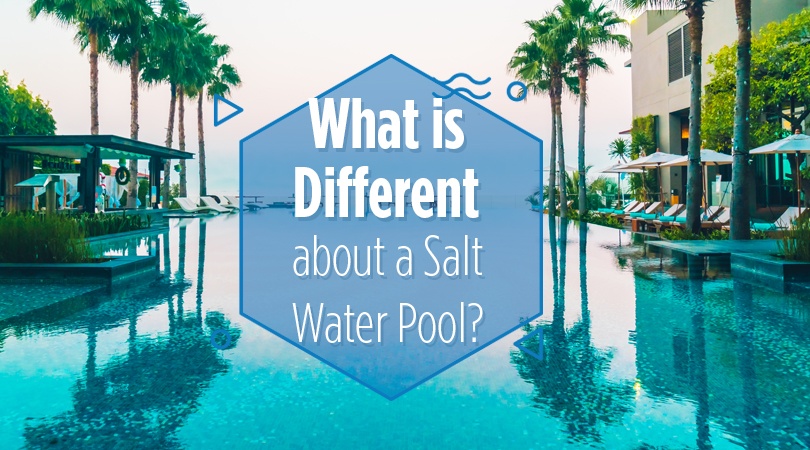
If you are exploring installing an eco-friendly swimming pool, the suggestion to consider a salt water pool has likely come up. Salt water pools have become more popular in recent years in part because they use less chlorine than traditional pools. There are a few differences to be aware of when purchasing a salt water pool including water buoyancy, pool equipment and chemical combinations for water balance.
Installing a salt generator requires plumbing the part into the pool pump and filter. In a salt water pool, a salt generator dispenses table salt (NaCl) through the pool’s filtration system. This unique part is called a salt generator or salt chlorinator. NaCl converts to chloride ions, and then ions are converted to chlorine gas. The gas enters the pool as water circulates through the pool pump.
“As salt water begins to flow through the generator it is electrolytically converted to pure chlorine. The chlorine is then automatically distributed to your pool, sanitizing your water by eliminating biological and bacterial growth.” (source)
The gas then converts back into NaCl replenishing itself and significantly reducing the number of chemicals one needs to purchase.
A salt water pool only replaces chlorine. In order to prevent bacteria growth, you will still need the additional traditional chemicals. You should still test your swimming pool water regularly, but since the salt replaces itself, chemical levels often stay even unless water displacement from a storm or leak occurs. You will save time and money when you don’t need to add more chemicals as often.
The salinity level will depend on the size of the pool and the manufacturer of the pump system. While it’s most important to follow your manufacturer guidelines, we can offer some ranges to be aware of for chemical balance. Ideally, the salinity level should be 2500 - 4500ppm. A chlorine level of 2ppm is ideal for salt water pools. Alkalinity levels should be 8-120ppm, and you will still need to add a stabilizer to your saltwater pool such as cyanuric acid to help stop the sun's UV rays from breaking down free chlorine in the pool. Usual levels are 20 – 50 ppm. Your pH levels will need to be between 7.2 and 7.8. Chlorine is more effective if the pH stays closer to 7.2 in a salt water pool whereas a traditional pool pH is ideally closer to 7.5.
It’s important to consider the decking you install around your pool and the equipment you install if you decide to go with a salt water pool. Salt can corrode some pool equipment and surrounding deck materials.
Common pool damage from salt includes:
Another caution of salt water pools is that if the water pH or other chemicals become unbalanced, it’s more complex to fix and doesn’t often happen as quickly as with a traditional chlorinated pool.
The main positive of a salt water pool is the ability to have safe water without chlorine. Salt water is not as harsh on the skin and eyes. It’s also safer to store and handle than chlorine.
Because unbalanced salt water chemicals can be challenging to rebalance, it’s important to look for pool and pool pump leaks routinely and proactively. Aquaman Leak Detection is available to service commercial and residential salt water pools throughout Florida. Aquaman’s technicians are often able to identify and repair pool leaks in the same service call. Contact Aquaman today to schedule your appointment.

With over 20 years of reputable experience finding leaks, owner Lowell Ball created a unique and patented leak detection system that accurately finds leaks without damaging property. We are so confident in our system and our workmanship, we offer the strongest warranty in the industry.
Aquaman Leak Detection Corporate
1275 South Patrick Dr, Suite A6
Satellite Beach, FL 32937
Owner Direct: 321.431.4784
844.766.5532 (844 POOL LEAK)
info@aquamanleakdetection.com
Office Hours:
9AM-6PM Mon-Fri
Emergency Service Available 24/7
Blog Comments